What's going on in Avowed? We quiz Obsidian after the Xbox Developer Direct
"For us, the reference point we've been trying to point people to is The Outer Worlds."
Last week, we finally got
a proper look at Obsidian's new role-playing game Avowed. It was one of the handful of exclusive Xbox games at the Developer Direct, so the spotlight was searingly on it. But while there were things I was encouraged by - I really liked the otherworldly, colourful setting - there were other things I was less convinced about, and a bit confused about. Because for all it was billed as a deep dive, this showing, I didn't come away with a solid sense of what we'll do in the game besides fight, so when Obsidian offered me a chance to talk to Avowed game director Carrie Patel and gameplay director Gabe Paramo afterwards, to clear a few things up, I took it.
Avowed is the first-person RPG set in the same world as
Obsidian's Pillars of Eternity series, Eora, but which plays very differently. The Pillars series is a real-time-with-pause, traditional CRPG, played from an isometric viewpoint. Avowed, on the other hand, pulls you right into the character's body to see through their eyes, meaning you'll both see and experience Eora in a completely new way.
However, something worth stressing is that while the
world of Eora is the same for the Pillars series and the Avowed games, their
specific settings within that world don't overlap at all. As game director Carrie Patel explains to me - she who has worked all through the Pillars series of games, by the way, so knows them very well - Avowed takes place on an island continent called the Living Lands, which is far, far away from the Eastern Reach and its nearby archipelago where the Pillars games take place. There's a huge amount of ocean in between.
"The game of Avowed takes place entirely in the Living Lands so you won't be visiting other locations in the world," Patel says. "Players who are familiar with past games will certainly recognise some concepts and even a few characters - certain events that they either saw or heard about in those old games do occasionally come up in references in Avowed - but we wanted to make sure that this was an experience that players having their first adventure in the world of Eora could jump right into. So those references are there for people who are going to get them and appreciate them, but players who aren't familiar with them will skate right on through them."
Related to that is the question of "when does Avowed take place?" because you'll know, if you've played Pillars of Eternity 2: Deadfire, that events of biblical proportions - wink wink nudge nudge - take place at the end. They can't help but affect the entire world and everything living in it. However, while Avowed will, apparently, take place shortly after the events of Deadfire, Patel says it won't narratively be connected to it. "The two storylines are very separate," she adds - as separate as the continents they take place on. "The process that Eothas sets in motion at the end of Deadfire is not an instantaneous state-change in the world," she explains. "It's something that is going to take place and slowly change the world over generations, not overnight, so that gives us a bit of breathing room to give the player some other adventures in the interim."
The Avowed showcase focused heavily on combat, as mentioned above, and we saw the player swinging swords and blocking attacks, and firing off spells, all in real-time. Nevertheless, the intention of the game is not to be a hack-and-slash but instead, a kind of rock, paper, scissors experience, where different enemies will require different approaches, though all will come at you at once. (By the way, there's
an extended version of the Avowed Developer Direct that I recommend watching. It's not drastically different but does give a better sense of combat in the game.)
Key to this are "loadouts", which was a word we heard multiple times throughout the presentation. The idea is you'll be able to quickly switch between sets of weapons in order to overcome the different enemy-based challenges. Need a sword and shield for these enemies? No problem. Need a two-hander to break this one's guard? You got it. Need a pair of wands to pelt these enemies with magical attacks? Fine. It's that kind of thing.
What I wasn't clear on, though, was how the player's innate magical abilities are used. We saw various examples of them in play - magical pulls, magical tree roots holding enemies in place, and that sort of thing - but there was no user-interface on the screen. How was the player doing that?
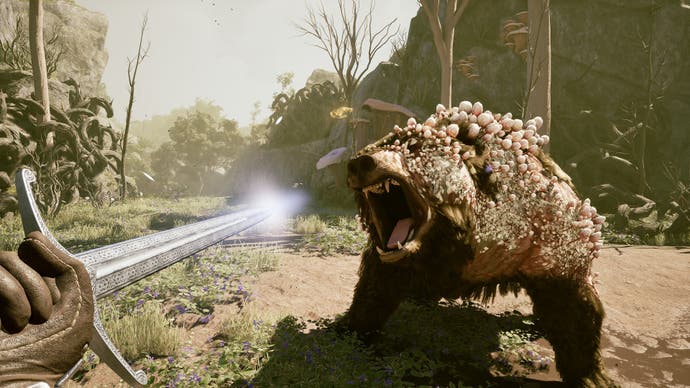
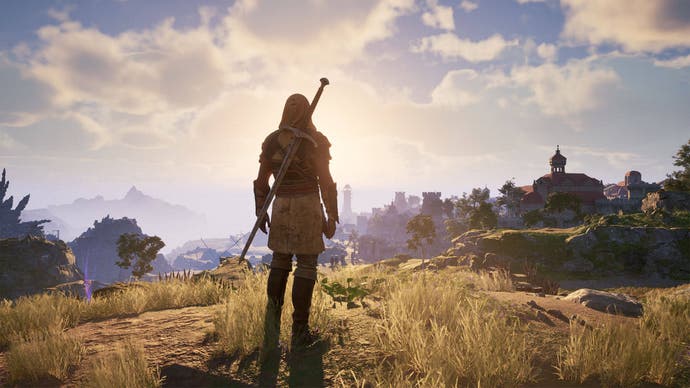
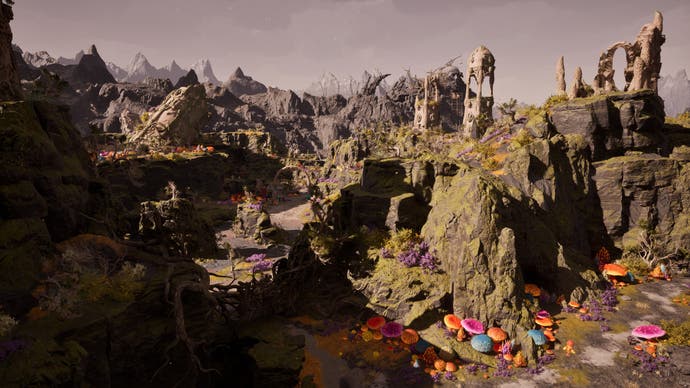
There's a slightly alien feel to the fantasy world of Avowed. | Image credit: Obsidian Entertainment
I ask gameplay director Gabe Paramo and he gives me a slightly mystifying answer; he says spells are "on their own button". "There's a single button to use an ability, in terms of the ones that you have on your talent tree." This immediately makes me think of the one-button approach Fable 2 used, but I don't know if that's what's going on here. We didn't see a UI, he tells me, because one hasn't been definitively decided on.
As for character development, Avowed will be a classless game. You'll earn experience points as you fight and adventure around the world, and then level up - and then spend the point you earned for levelling up in whichever skill tree you want to pursue. There will be character creation too, "We're just not talking about it yet," Patel says.
Avowed will also have companions to adventure with, and we got a glimpse of them in the presentation. There was the blue-skinned Kai, who I think looks a bit like Yondu from Guardians of the Galaxy, and there was human-looking Giatta. They'll fight with you in combat, with Kai serving as a tanky character and Giatta as a healer, and you'll be able to command them in some way. "Yeah," says Paramo, "they have some active combat abilities; you can kind of see what they're doing in the video. Then there's more player-driven abilities that the player can access as well. And [they're] somewhat like an extension of the player in terms of how we wanted to present that - it's still tied to that singular ability button."
It's, again, a slightly unclear answer, and it's another mention of that intriguing singular ability button. Is it a context-sensitive thing? "Yeah, exactly," Paramo answers, but that's as much explanation as I get. "Just going to clarify," Carrie Patel adds: "[companions] will also follow you into combat, so you don't have to micromanage their every move. But as Gabe is saying, their abilities are there for you to deploy tactically." You'll be able to level-up your companions and choose where their skill points go, too.
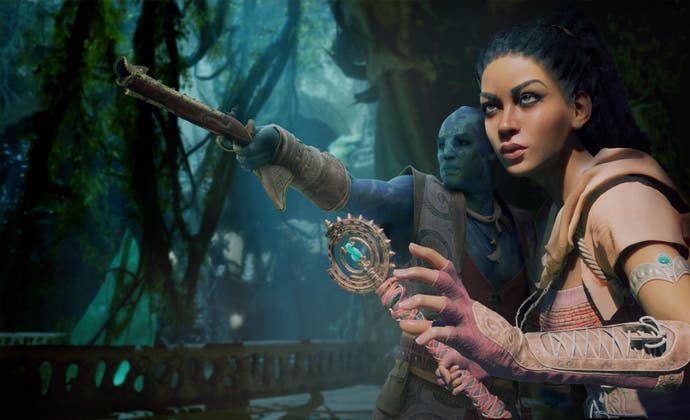
The two companions in Avowed we know of so far. We don't know how many there'll be in total, but there will be a few more. The blue-skinned character at the back is Kai, and the human character at the front is Giatta. | Image credit: Obsidian Entertainment
But you won't be able to romance companions, notably. "You can't romance your companions in Avowed," Patel confirms. "I know we did some romances for companions in Deadfire, but the thing we found, which I'm sure any developer who has tried them has found, is that to pay them off, you really have to invest a lot in doing them well. And you also want to balance whatever you're putting into romantic relationships with ensuring that players who don't choose the romance path still have a fulfilling and complete experience with those companions."
The companions in Avowed will be tied more tightly to the story than in previous games, apparently, and the team wants to make sure they hit their story beats without confusing the issue with relationships. "We wanted to make sure that we were paying that off and we didn't feel ready to do romances as well," Patel says. "Especially because it gets kind of awkward if you're trying to save the world together and then you've broken up but this person is still travelling with you."
To me, maybe that's a suggestion Avowed will be more linear than Obsidian's other RPGs, but I don't know that for sure. It does, however, build on a feeling from the presentation that Avowed is more of an action game with RPG elements, than an RPG with action elements. "Don't panic," Carrie Patel tells me. "Avowed is still jam-packed with characters and dialogue, and dialogue choices, and all of the things that people are used to from Obsidian branching story and branching narrative.
"Right now, we wanted to focus a little bit more on showing off the gameplay, in part because what the team has been doing really is going to show up as best in class, in terms of a first-person action RPG game with a heavy focus on melee combat, and we will show more about the story and the world-building aspects in future updates. But also, as a former narrative designer, I know long dialogue trees tend not to make for the best video reveals, so we wanted to make sure to give players a sense of the action and momentum that they'll get with the gameplay."
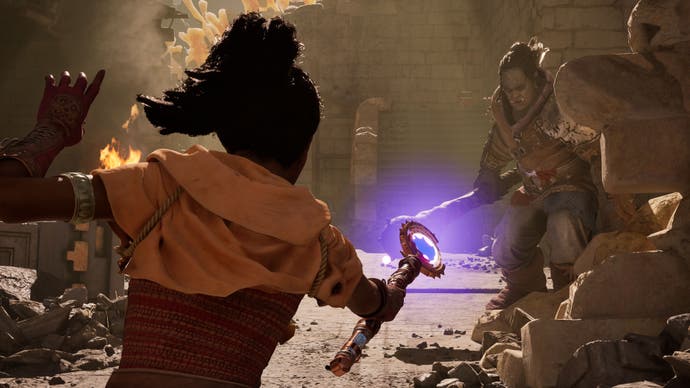
Avowed is first-person, so I'm not entirely sure why we're seeing this character from over the shoulder. Perhaps we're stood behind them? | Image credit: Obsidian Entertainment
Also remember - as Gabe Paramo points out - that what we saw in the showcase was alpha gameplay and still subject to change. "There's feedback on the internet and it's both positive and not as positive, which is fine," he says. "And we hear that. And we've already been actively - even as we were watching [the showcase] - [addressing that]. So we are continually improving as we share more."
Those mixed reactions he references have, I believe, something to do with perceptions of what Obsidian is capable of as a Microsoft-owned studio now (Microsoft acquired Obsidian in 2018). This game is really the first big RPG Obsidian has made with Microsoft as its owner - Grounded and Pentiment were smaller projects (Grounded grew after its initial success), and The Outer Worlds was a Private Division/Take-Two game. So there's a lot of pressure on Avowed that comes from that.
But Microsoft has not transformed Obsidian or its capabilities. It actually sounds like the studio is the same size it's been for a while. Avowed is made by roughly 100 developers internally, Patel tells me, with the help of a "couple" of co-developers she doesn't name, and some outsourcing partners which are, again, unknown. "But those are a much smaller chunk of the team than something that you might have on one of those 400-person teams," she says, "where you've got 400 internal developers and three separate co-dev teams, also of 400. So that gives you an idea." This is why she refers to Obsidian as a "medium-sized studio", and Avowed as a "medium-sized project".
Just to quickly put that into perspective: around 400 people made Baldur's Gate 3 at Larian Studios, and more than 2000 people were listed in the credits for the game, including outsourced help.
"As a developer it's always challenging," Patel adds, "because you know what your team size is and what your budget is, but most players don't. You have some players who follow the industry very closely and might tailor their expectations accordingly, but most people who are coming to games just want a good experience, and they don't know what your staff size is or how many dollars you had to spend, and frankly, that's not for them to care about. They just expect a good game.
"For us, the reference point we've been trying to point people to is The Outer Worlds," she adds. "That's also a game that has a very comparable scope, a very comparable approach in terms of having a series of open regions - rather than one massive open map that you can walk from one corner of, to the opposite, in however many hours that takes. It did very well with that model. The team was able to tailor their content and the pacing of the experience accordingly."
"Scope is definitely not equivalent to quality," she adds. "What the relationship with Microsoft has allowed us to do is not drastically change the kinds of games we're making, but just allow us to make the kinds of games that we love making, and know how to make, with a bit more stability and predictability behind us."
As a fan of Obsidian's work, and the Pillars of Eternity series, I'm happy to give Obsidian the benefit of the doubt. But I do hope we see, in the coming weeks and months, some of the more reassuring Obsidian RPG elements in Avowed, to put concerned minds at rest. Oh and perhaps on that note: if you're wondering whether Pillars co-creator Josh Sawyer is involved with Avowed in any way, he is, albeit tangentially. "Josh is the studio design director so at some point he tends to have some involvement with most of the projects going on in the studio," Patel says, "to some degree or other. Since Pentiment released, he has been helping us out a little more directly on the gameplay side, and occasionally pinch-hitting in a few other areas as we all tend to do in medium-sized [projects/teams]."







































